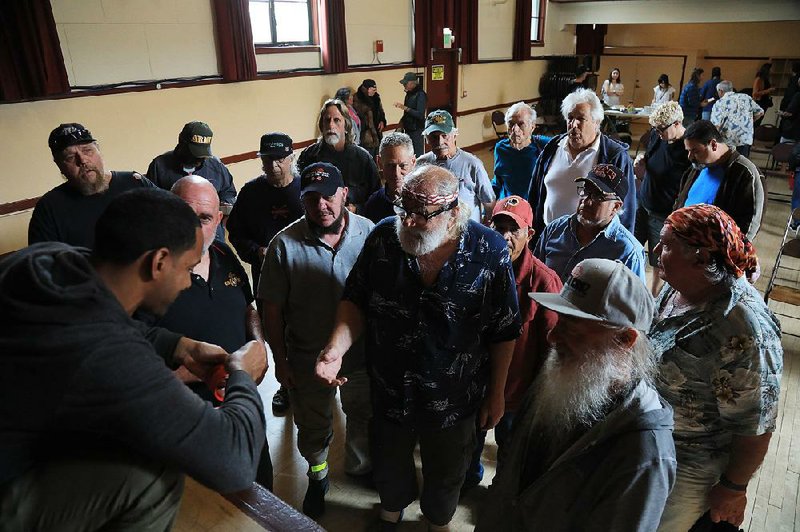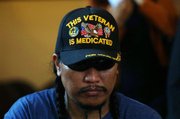SANTA CRUZ, Calif. -- Some of the cannabis growers along the California coast see donating part of their crop of high-potency medical marijuana to ailing veterans as an act of medical compassion.
The veterans line up by the dozens each month in the echoing auditorium of the city's old veterans' hall to get tickets they can exchange for free bags of marijuana.
One Vietnam veteran in the line said he was using marijuana-infused oil to treat pancreatic cancer. Another said smoking cannabis eased the pain from a recent hip replacement better than prescription pills did. Several said that a few puffs temper the anxiety and nightmares of post-traumatic stress disorder.
"I never touched the stuff in Vietnam," said William Horne, 76, a retired firefighter. "It was only a few years ago I realized how useful it could be."
The monthly giveaway bags often contain marijuana lotions, pills, candies and hemp oils, as well as potent strains of smokable flower with names like Combat Cookies and Kosher Kush. But the veterans do not get any medical guidance on which product might help with which ailment, how much to use or how marijuana might interact with other medications.
Ordinarily, their first stop for advice like that would be the Department of Veterans Affairs health system, with its thousands of doctors and hundreds of hospitals and clinics across the country dedicated to caring for veterans.
But the department has largely said no to medical marijuana, citing federal law. It will not recommend cannabis products for patients and for the most part it has declined even to study it for any potential benefits. That puts the department out of step with most of the country, where at least 30 states now have laws that allow the use of medical marijuana in some form.
A department survey suggests that nearly 1 million veterans may be using medical marijuana. But doctors in the veterans health system say the department's lack of research has left them without much good advice to give veterans.
"We have a disconnect in care," said Marcel Bonn-Miller, a psychologist who worked for years at the veterans hospital in Palo Alto, Calif., and now teaches at the University of Pennsylvania medical school. "The VA has funded lots of marijuana studies, but not of therapeutic potential. All the work has been related to problems of use."
Bonn-Miller said that in 2016, he wanted to study the health outcomes of the veterans who were getting cannabis from the Santa Cruz Veterans Alliance, but he did not seek funding from Veterans Affairs because of the department's lack of interest in therapeutic use.
Congress is now considering changing that. A bipartisan bill introduced in the House of Representatives this spring would order the department to study the safety and efficacy of marijuana for treating chronic pain and PTSD. If the bill passes, the department could not only develop expertise about a drug that many veterans have turned to on their own, it may also start down the road toward eventually allowing its doctors and clinics to prescribe cannabis.
"I talk to so many vets who claim they get benefits, but we need research," said Rep. Tim Walz, D-Minn., who introduced the bill along with Rep. Phil Roe, R-Tenn., who is a physician.
"You may be a big advocate of medical marijuana, you may feel it has no value," Walz said. "Either way, you should want the evidence to prove it, and there is no better system to do that research than the VA."
A spokesman for the Department of Veterans Affairs said Congress would need to do more than pass the current House bill. Spokesman Curt Cashour said that because cannabis is classified as a Schedule 1 drug under federal law, researchers would need to secure approval from five separate agencies to conduct studies.
"The opportunities for VA to conduct marijuana research are limited because of the restrictions imposed by federal law," Cashour said. "If Congress wants to facilitate more federal research into Schedule 1 controlled substances such as marijuana, it can always choose to eliminate these restrictions."
Veterans are not waiting for a green light from Washington. A department survey in 2017 found that nearly 9 percent of veterans reported using cannabis in the past year and almost half of those were using it for medical purposes.
The growing use of medical marijuana among veterans is not without risks, though. Cannabis can interact with some prescription medications. Frequent use can lead to dependency and abuse. New forms of concentrated cannabis that are inhaled as vapor can compound both of those problems. And cannabis's therapeutic value in treating chronic pain, PTSD and other ailments is far from clear.
Veterans who look for information about medical marijuana online find a proliferation of marketing claims and testimonials, many of them dubious. Several companies sell nonpsychoactive hemp oil for as much as $150 an ounce that they say is rich in cannabidiol, also known as CBD. The Food and Drug Administration has gone after marketers whose claims for cannabidiol as a treatment for PTSD violate its rules.
A 2017 report by the National Institutes of Health found evidence of a number of therapeutic benefits of cannabis and its various components but said there had been little research relating specifically to post-traumatic stress.
"CBD may be of huge benefit, THC may be of huge benefit, but there are also risks of abuse and bad outcomes," said Bonn-Miller. THC, or tetrahydrocannabino, is another cannabidiol.
"We'd like to know more, so we can figure out what works and what doesn't," said Bonn-Miller, who is conducting several cannabis studies now without financial backing from the VA.
SundayMonday on 07/29/2018

